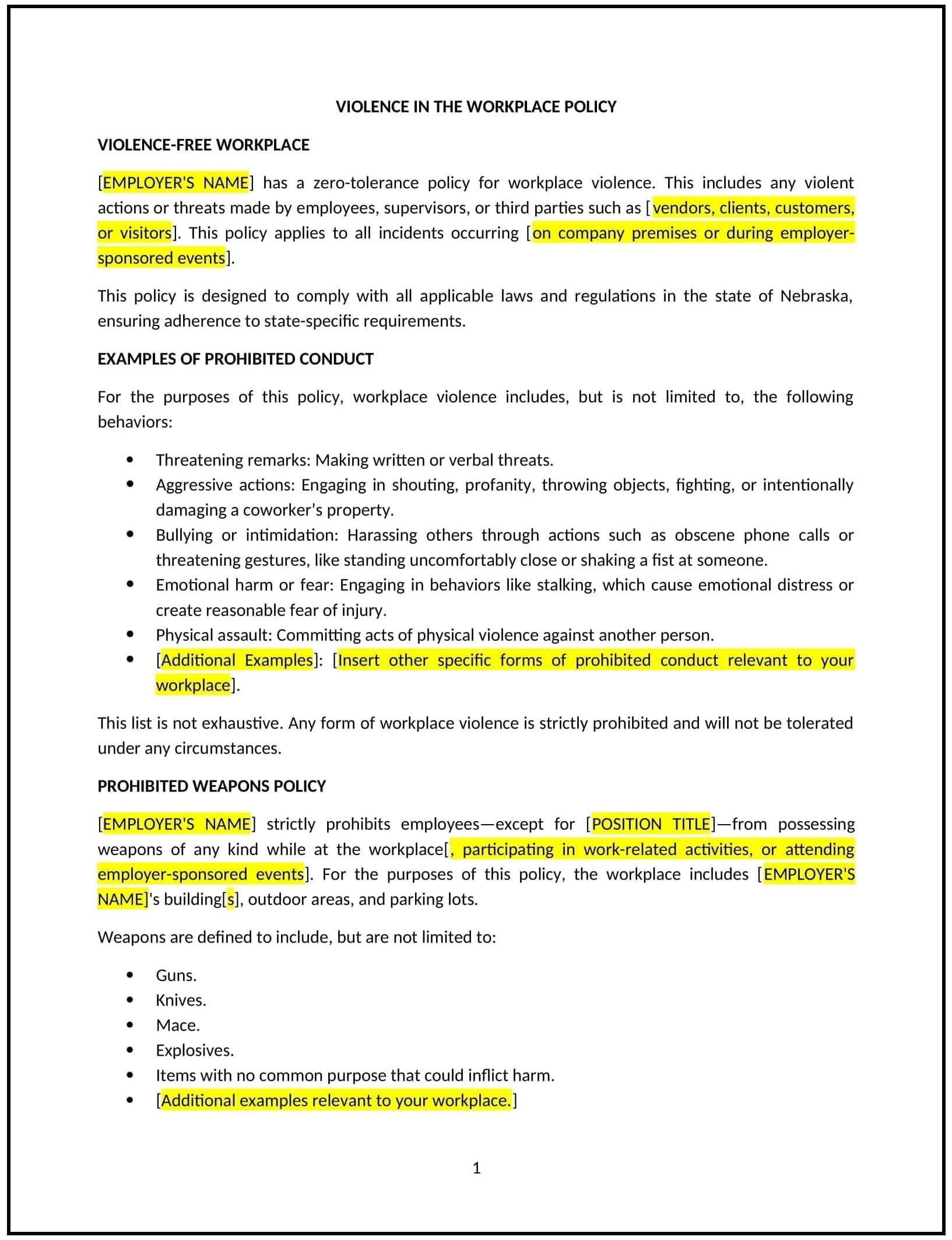Violence in the workplace policy (Nebraska): Free template
Got contracts to review? While you're here for policies, let Cobrief make contract review effortless—start your free review now.

Customize this template for free
Violence in the workplace policy (Nebraska)
A violence in the workplace policy helps Nebraska businesses create a safe and secure environment by setting expectations for behavior and outlining procedures for preventing, addressing, and responding to workplace violence. This policy covers physical violence, threats, harassment, bullying, and any form of intimidation that could lead to unsafe conditions. It is designed to prevent violence, protect employees, and ensure a respectful and productive workplace.
By adopting this policy, businesses in Nebraska can take proactive steps to reduce the risk of violence in the workplace and address any incidents quickly and effectively.
How to use this violence in the workplace policy (Nebraska)
- Define workplace violence: Clearly define what constitutes workplace violence, including physical altercations, threats of violence, harassment, bullying, and any other behavior that creates an unsafe or hostile work environment. The policy should also address non-physical violence, such as verbal threats or intimidation.
- Set expectations for behavior: Employees should understand that all forms of violence, including threats, intimidation, and physical altercations, are strictly prohibited. The policy should promote a culture of respect, professionalism, and mutual consideration, where employees are expected to treat each other with dignity and kindness.
- Establish reporting procedures: Outline how employees can report incidents of workplace violence or concerns about potential violence. This includes identifying trusted individuals, such as supervisors, HR representatives, or safety officers, who employees can contact confidentially.
- Provide training: Offer regular training for employees and management on how to recognize early warning signs of violence, how to de-escalate potentially violent situations, and how to report concerns. Training should also cover conflict resolution techniques and communication skills to prevent misunderstandings.
- Develop emergency response plans: Create procedures for responding to violent incidents in the workplace, including evacuation routes, emergency contacts, and protocols for involving law enforcement or security. Employees should know how to react in an emergency situation and who to notify.
- Ensure victim support: Provide resources for employees affected by workplace violence, such as counseling or employee assistance programs (EAPs). Ensure that victims of violence feel supported and are able to seek help without fear of retaliation or discrimination.
- Maintain a zero-tolerance policy: Clearly state that any employee who engages in workplace violence, or who fails to report violence, will face disciplinary action, up to and including termination. Ensure that all employees understand the consequences of violent behavior and the importance of maintaining a safe work environment.
- Review and update: Regularly review and update the policy to ensure that it reflects current best practices, addresses emerging threats, and aligns with changes in Nebraska state laws or industry regulations.
Benefits of using this violence in the workplace policy (Nebraska)
This policy provides several benefits for Nebraska businesses:
- Promotes safety: By clearly defining unacceptable behaviors and establishing reporting procedures, businesses can proactively prevent violence and ensure a safer environment for all employees.
- Reduces liability risks: A well-documented and enforced violence prevention policy can help businesses reduce their risk of legal claims related to workplace violence, harassment, or unsafe working conditions.
- Improves employee well-being: A safe and supportive workplace enhances employee morale and reduces stress, leading to higher productivity and engagement.
- Enhances company reputation: A commitment to workplace safety and respect helps businesses build a positive reputation, attracting and retaining talent while improving relations with clients and customers.
- Fosters a positive work culture: By setting clear expectations for behavior and addressing violence effectively, businesses create an environment that encourages respect, trust, and collaboration among employees.
Tips for using this violence in the workplace policy (Nebraska)
- Communicate the policy clearly: Ensure that all employees are aware of the violence in the workplace policy, its expectations, and how to report concerns. The policy should be included in employee handbooks and covered during onboarding and regular training sessions.
- Encourage early reporting: Encourage employees to report any concerns about violence or potential violence early, before situations escalate. Ensure employees feel comfortable coming forward without fear of retaliation.
- Create a supportive work environment: Foster a workplace culture where respect and professionalism are prioritized. This includes promoting positive communication, offering conflict resolution resources, and supporting employees who may be at risk of experiencing violence.
- Monitor workplace dynamics: Keep track of workplace interactions to identify potential stressors or issues that could lead to conflict or violence. Take proactive steps to address tensions before they escalate.
- Review and adjust the policy regularly: Review the violence in the workplace policy at least annually to ensure it remains effective and reflects any changes in the law, workplace dynamics, or best practices.